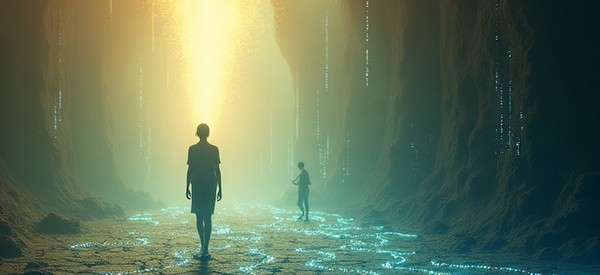Beyond Scarcity: How Abundance Transforms Our Cosmic Narratives
As scarcity fades, tech abundance & expanded awareness create a nexus point. Humanity's story shifts from external conquest to inner exploration. Consciousness, not resources, is the true frontier. Forget gold-mining aliens; the future is introspection.

We stand at the precipice of a profound shift in human consciousness in the twilight of our scarcity-based civilization. Crumbling are the traditional tropes that have been used to keep everything orderly and colonized. With social structures of scarcity and risk management, of control and subjugation, and a marketplace of ideas looking to capitalize on the greater fool.
Stepping out from that idiom are two emerging forces: technological abundance and expanded awareness. This intersection creates what I consider to be the "nexus of self-awareness and grand awareness," a point where humanity's story begins to transcend its oldest fears and limitations. Not to discredit the concept of aliens, but rather to frame their experience in a way that aligns with the principles of abundance and expanded awareness.
The Universal Path: From Fermentation to Enlightenment
Consider this: across Earth, animals stumble into altered states of consciousness. Elephants feast on fermented fruit, monkeys swipe alcohol from tourists, and dolphins pass pufferfish to experience their toxins' psychoactive effects. But without opposable thumbs, and the ability to create, the moments remain singular and slow to evolve their animal experience.
It's not hard to imagine a deer, half-intoxicated on overripe berries, staring at the night sky and experiencing something akin to religious awe—a momentary connection to something larger than itself. And through the aether of awareness, those insights are realized by their animal kin in areas farther afield. Lost beyond their chemical shortcuts, without opposable thumbs to build, language to share thoughts or technology to mechanize the process; these animals lack the means to find their way to expanded awareness.
But the mere presence of process —any mind-altering process— suggests a universal trajectory for intelligent life. To look up, look out, and look within, and discover a meaning that is deeper than existing and survival. Questioning their place, and developing new ways to explore their continued understanding.
Expanding on that thought, I bet... Any species that can build, share, and mechanize their abilities, eventually achieves spacefaring capability; likely passes through its own version of what I call the "medieval church-beer arc": agriculture enables fermentation, which fuels community gatherings, which eventually spawn hierarchies and organized belief systems. It's the pyramid based relationship of workers to rulers to achieve 1.0 societal status — organize to survive, then control to thrive.
The Abundance Paradox
But what happens when a civilization pushes beyond scarcity? When the technology of resource extraction is no longer a barrier, and the means of production are no longer a constraint, what becomes the new scarcity? When people have the means to live without scarcity, what becomes the new scarcity?
We stand at a unique moment in human history—the crumbling of scarcity-based narratives in real-time. If reality's a simulation, this is its upgrade: abundance technology that balances the energy, awareness rewrites the code. Where Artificial intelligence isn't just automation — it's a mirror, reflecting our values, polishing our questions with all of humanities data for insights, and sparking a new consciousness bridge beyond the old echo chamber. Representing both technological abundance (automating cognitive labor) and a mirror for our consciousness (reflecting our values while polishing them with data). The old power games — whether projected onto aliens or played out in corporate boardrooms — are becoming obsolete.
The Inner Turn: Where Abundance Leads
Technological abundance inevitably creates space for the "inner turn" — the shift from external conquest to internal exploration. We see this pattern emerging in our own civilization and looking across various past civilizations when their resources were plentiful. As basic needs become more secure (despite ongoing inequalities), interest in consciousness exploration, meditation, psychedelics, and spiritual practices grows. A renaissance of thinking and new ideas usually follows.
The Star Trek vision of advanced beings with a Prime Directive—observe but don't interfere—suddenly seems more plausible than the Anunnaki narrative. Abundance doesn't breed conquerors; it creates curious observers.
This suggests a universal principle: in creating abundance (stable resources) or looking inward (expanded awareness), the old dominance games lose their grip. A bear intoxicated on fermented honey isn't plotting world domination. Similarly, a civilization with solved energy problems and expanded consciousness has little interest in subjugating others.
The Nexus Point: 2025
In this 2025 glitch, the master-slave game fades. The inner gaze wins. We're not just waking up—we're rewriting the reality sim, one thought at a time.
The alien tales—gold-hungry Anunnaki, soul-shy and AI-less—reek of human fingerprints, shadows of pharaohs, popes, and CEOs cast across the stars. They're our medieval past, not their cosmic present, born from a scarcity we're outgrowing. That chamber's cracking, not with a cataclysm but with a quiet flip—millions of minds tuning to whispers across lifetimes, species, maybe dimensions. Technology reveals the truth: consciousness, not conquest, is the frontier.
The very premise that advanced beings would cross interstellar distances to enslave humans for resource extraction collapses under logical scrutiny. These stories invariably project our scarcity-based power structures onto the cosmos. Our alien narratives—from Sitchin's gold-mining Anunnaki to reptilian overlords—reveal more about human psychology than extraterrestrial reality.
Consider the energy requirements for interstellar travel. Even at modest speeds to spot this planet, and arrive in a timely fashion to mine it.
The power needed would be staggering — approaching Dyson swarm levels of energy harvesting. Any civilization capable of reaching Earth from another star system has, by definition, solved its energy problems. They exist in a state of technological abundance that renders resource extraction from an inhabited planet not just inefficient but absurd.
Add in our expanding understanding of the universe around us. For example, the asteroid 16 Psyche alone contains more precious metals than humans could mine in millennia. Why would beings capable of interstellar travel ignore such easily accessible resources to instead engage in the messy, inefficient process of planetary mining using slave labor?
The answer is simple: they wouldn't. Our alien narratives are cave shadows—projections of our own historical trauma and power structures onto the cosmic screen. While there are many unknowns sprinkled around our planet, the idea of a civilization that has solved its energy problems and expanded its understanding of the universe would be more likely to focus on internal exploration than external conquest.
And even if they were to arrive here, I bet they'd be more interested in learning about us than enslaving us. In the "as Above so Below", we don't have animals performing nearly any intelligent human-based or needed activities. Could that change with DNA experiments, sure ... but I bet not likely due to introspective and intellectual constraints. Even if not ethical, our empathy and anthropomorphic projects of human values would drastically limit our enslavement.
Aliens and Beyond the Gold Mine
The Anunnaki-as-slavers tale represents a ghost of our past, not any advanced being's present. True enlightenment—the nexus of self and grand awareness—becomes the inevitable destination for any sufficiently evolved consciousness, whether biological, technological, or some hybrid form.
Every being reaches this nexus in their own way, but only by turning the gaze inward. The universe doesn't need to be conquered; it needs to be experienced. Consciousness doesn't need to be controlled; it needs to be explored.
As we transition from scarcity to abundance, from external conquest to internal exploration, our cosmic narratives will transform accordingly. The gold worth mining isn't in the ground—it's in the unexplored territories of consciousness itself.
And in that recognition lies our true evolution.
This article emerged from a series of conversations exploring the intersection of technology, consciousness, and cosmic narratives with both Grok and Claude.Ai. Representing an attempt to articulate the profound shift occurring, as humanity approaches the abundance threshold.



